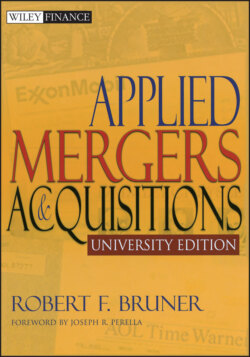Читать книгу Applied Mergers and Acquisitions - Robert F. Bruner - Страница 43
Consequences
ОглавлениеIt is uncertain how employees or suppliers might fare after a takeover by Saul Steinberg, but his predilection to break the linkage between films and theme parks might lower the enjoyment for customers. On balance, greenmail to preserve the status quo might serve the interests of these groups. As for shareholders, circumstances might exist in which they would be better off after the greenmail payment even if they were discriminated against, their agents acted in self-interest, and the action was not freely taken. A decision involves weighing the evident costs of greenmail versus the potential benefits. One might argue that to place a price on discrimination or the loss of free choice is impossible and that managerial self-interest is always bad. Yet, in many ways every day, individuals submit to discrimination or loss of choice to enhance their own welfare. Furthermore, managerial self-interest is not harmful per se to shareholders; managerial and shareholder self-interest undoubtedly coincide in a wide range of decisions.
The key question is whether Disney’s shareholders would receive any benefits to offset the costs of greenmail. The facts in the Disney case imply that management may have had an estimate of the intrinsic value of the firm that was materially higher than the ex ante share price or than a potential greenmail price per share. Under this circumstance, any repurchase of shares at a price less than intrinsic value will transfer wealth from the selling shareholders (i.e., the greenmailer) to the remaining public shareholders. The total wealth transferred depends on the difference between what the greenmailer (e.g., Steinberg) would have received had he bought and held versus what he actually received. If the wealth transfer is positive and material, Ron Miller might be justified in paying greenmail.
